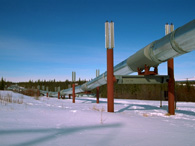
KREMLIN STOPS GAS DELIVERIES TO UKRAINE
Publication: Eurasia Daily Monitor Volume: 3 Issue: 1
By:

Authorized by President Vladimir Putin, Gazprom halted deliveries of Russian gas to Ukraine as of 10 am Moscow time on January 1. To maximize the political impact in Ukraine, Russia’s state-controlled television channels showed Putin, his close aide and Gazprom chairman Dmitry Medvedev, and other top officials authorizing the halt in supplies to Ukraine. The channels also showed overdramatized scenes from Russian compressor stations near the Ukrainian border shutting off the supply valves to that country.
The halt means that Russia no longer compensates Ukraine for the transit of Russian gas to European countries through Ukrainian pipelines. The compensation gas — in lieu of cash — to Ukraine amounts to some 25 billion cubic meters annually, its daily volume being some 120 million cubic meters at this time of the year when the demand peaks. Gazprom is now withholding this volume from Ukraine.
At the same time, Moscow publicly threatens to block the access of Turkmen gas to Ukraine. Kyiv and Ashgabat have signed a massive supply contract for 2006, but the Turkmen gas can only reach Ukraine through Gazprom’s pipelines in Russia. The two pincer moves threaten Ukraine with imminent economic and political crisis, unless Brussels and Washington intercede to restrain Moscow.
Moscow’s main goals are twofold: to defeat Ukraine’s Orange political camp in the upcoming parliamentary elections and compel Ukraine to turn its transit pipeline system into a Russian-Ukrainian consortium. Gazprom is clearly signaling that it would offer preferential prices for gas in return for shared ownership in the pipelines.
Meanwhile, Gazprom continues its deliveries to European countries in accordance with the supply contracts for 2006, which presuppose transit through Ukraine. These deliveries total slightly over 100 billion cubic meters for the year, with a daily flow of some 360 million cubic meters at this time through Ukrainian pipelines.
Moscow has apparently anticipated two possible reactions from a cornered Ukraine: Either Ukraine will provide the transit service gratis before caving in quickly to Moscow’s demands. Or, alternatively,
Ukraine will stop some of the Russian gas en route to Europe and use that gas for Ukraine’s own needs, correspondingly reducing the volumes available to European countries under their contracts with Gazprom. In this case, Moscow will accuse Kyiv of “stealing” from European consumers and jeopardizing the European Union’s energy security. The second scenario is already coming to pass. Moscow is poised to use this as an argument for Europe to accept some form of Russian or Russian-German control over “unreliable” Ukraine’s transit pipelines.
German interests are minority shareholders in Gazprom, sit on Gazprom’s board, and are also the Kremlin’s partners in the planned Baltic seabed pipeline, short-changing Poland and the Baltic states. Apparently, those German interests were unable or unwilling to oppose the Kremlin and Gazprom’s joint move against Ukraine.
On January 1-2, some European Union member countries, including Germany, Austria, Italy, Hungary, Poland, and Slovakia reported shortfalls in the planned volumes of Russian gas reaching these countries via Ukraine. Apparently, Ukraine began diverting some Russian gas to use it within Ukraine. Prime Minister Yuriy Yekhanurov and other key officials had indeed announced during the final days of 2005 that Ukraine could not possibly be expected to provide the transit service gratis after January 1. They cautioned Moscow that Ukraine would retain or its own use a share of the westbound Russian gas, if Moscow stops compensating Ukraine with gas for the transit service. Based on the Russian-Ukrainian contracts for 2005 and immediately preceding years, the compensation gas due Ukraine amounts to at least 15% of the annual volume of Russian gas en route to the West through Ukrainian pipelines.
On January 2, Gazprom responded with a skilled public relations move: It notified the EU and the shortfall-affected countries that Russia is willing to increase the volume of its gas pumped to Europe via Ukraine by the same amounts that Ukraine diverts for its internal use. Coupled with this offer is a vitriolic campaign by Gazprom and Kremlin officials — the two teams overlap at the top — accusing Ukraine of “thievery” at Europe’s expense.
Putin personally gave Ukraine a 24-hour ultimatum on December 30, demanding that Kyiv sign by the next evening a supply contract for Russian gas in 2006 on terms demanded by Russia, or else have the supplies halted on January 1. Russia’s final terms — which remain on
the table as of now — involve: more than quadrupling the price of gas at one stroke, from $50 to $230 per 1,000 cubic meters; and full payment in cash, ending the barter payment in the form of Ukrainian transit services for the Russian gas received. The volume supplied was to remain constant at 24 to 25 billion cubic meters in 2006.
(Interfax-Ukraine, TV Channel Five [Kyiv], RIA-Novosti, Russian TV Channel One, RTR Russia TV, NTV, December 26-January 2; see EDM, December 9, 12, 16)




